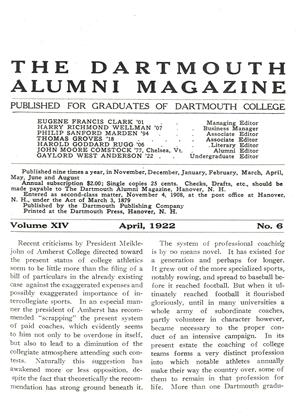Reprinted from Punch for Oct. 5, 1921. "Mr Ben Ames Williams is one of those vivid young American writers who tell a story with no waste of words and with the effortless clarity more often found in an eye-witness than in a creator of events. The poverty of language which has rendered American effort negligible in the higher branches of literature has made them the best of novelists. If there is a story to tell they cannot smother it with verbosity. If there is no story they cannot fashion one out of mere words. If Evered (Mills and Boon) should prove less popular than The Great Accident it will be because tragedy and not comedy provides the theme. Evered is a New England farmer of the caveman type whose violent and jealous passions and morose disposition compel him to make life an intolerable burden even to those he loves. In a paroxysm of jealous rage at finding his wife with a stranger he allows her to be killed by a savage bull, though well able to save her. Thereafter he forces himself to believe that his wife was unfaithful to him, but he knows in his heart that it was not so, and when at last he is confronted with evidence to this effect that cannot be gainsaid the volcano in him has become extinct, and he goes forth an aged and broken but no longer unhappy to meet death at the horns of the same bull that had killed his wife. This is the central theme of the story, a gloomy one indeed; but Mr. Williams is not out to harrow us and tells the tale with a simple directness that takes the sharp edge from the tragedy of it.
"Health and Efficiency," by John Daly McCarthy, M.A., Ph.D. (Dartmouth 1908), in charge of Hygiene, De Witt Clinton High School, New York City. H. Holt and Co: 1921.
This admirable little text-book for high schools is brimful of practical advice for the care of the body, and for sanitation in school, home and community, including the care and distribution of milk and other foods, the control of disease and noxious insects, and a chapter on industrial hygiene.
Its outlook on life is indicated by the frontispiece, entitled "Efficiency," a snapshot of one of our Outing Club experts poised in midair after a take-off from the Vale of Tempe Ski Jump.
It is a live biology that the books teaches, not a catalog of the 209 bones and countless muscles, bristling with Latin names, that confronted and confused the 19th century school-boy. Moreover, it is scientifically accurate, agreeably, clearly written, and full of sound common sense.
Vital statistics collected by Dean Emerson and six other Dartmouth Class Secretaries are cited to show that the use of the now obsolescent drug, alcohol, while in college is closely correlated with early death, the abstainer in the class of '68 saving on the average 18 years and 7 months over his more convivial classmate, the latter being nipped off at 44 years and 11 months. The soberer [and possibly congenitally more vigorous?] confrere, however, attains the ripe age of 63 years and 6 months. A similar advantage of from to IS years in favor of the abstainer was discovered in six other classes by six other class secretaries.
The book is more than a text to be conned only at school. It is a readable, useful sensible handbook of hygiene that may be read at home to advantage even by a college alumnus, Socially if he ha, , boy or girl with whom to talk it over.
The March issue of the Atlantic Monthly contains an article, "The Washington Conference" by Hon. Samuel McCall '74.
Homer" Eaton" Keyes '00 is the author of "The Boston State House in Blue Staffordshire" in the 'March issue of Antiques.
E. A. Woodward '21 is the author of an article, "Down the Connecticut" in the March issue of Outing. This is an account of the trip of the Ledyard Canoe Club of Dartmouth College on its trip from Hanover to Long Island Sound in May, 1921.
The address of His Excellency Channing H. Cox '01 to the two branches of the Legislature of Massachusetts, Jan. 4, 1922, has been published in pamphlet form.
The Boston Sunday Herald of February 5 contains an article by Hon. Samuel L. Powers '74, "Three Boys of Cornish." This is an ac count of Philander Chase, Nathan Smith and Salmon P. Chase, all of whom were intimately connected with Dartmouth College.
"Studies of Occupations in Agriculture, Forestry and Animal Industry," by Frederic J. Allen '89, a pamphlet of 39 pages, has been published by Harvard University.
"The Geology and Mineralogy of Braintree, Vermont," by Professor Charles H. Richardson '92, has been reprinted from the twelfth report of the Vermont State Geologist.
House Beautiful for March contains an article, "Framing the Garden," by Bremer W. Pond '07.
Walter B. Wolfe '21 is the author of a poem in the February Granite Monthly entitled "Reflets dans L'Infinite."
The Road Crossing Pasture Near the Site of Wentworth House
 View Full Issue
View Full Issue
More From This Issue
-
 Article
ArticleTHE GOVERNOR'S ROAD
April 1922 By NATHANIEL L. GOODRICH -
 Article
ArticleRecent criticisms by President Meiklejohn of Amherst College directed toward
April 1922 -
 Sports
SportsBASKETBALL
April 1922 -
 Article
ArticleRECOLLECTIONS OF RUFUS CHOATE
April 1922 By Miss M. A. CRUIKSHANK -
 Class Notes
Class NotesCLASS OF 1911
April 1922 By Nathaniel G. Burleigh -
 Article
ArticleNOTES
April 1922
Books
-
 Books
BooksAlumni Publications
December 1948 -
 Books
BooksPINE LAKE.
MAY 1972 By ARTHUR M. WILSON -
 Books
BooksRACIAL FACTORS IN AMERICAN INDUSTRY
April 1931 By E. K. Hall -
 Books
BooksTHE FALL LINE: A SKIER'S JOURNAL.
NOVEMBER 1969 By HOWARD P. CHIVERS '39 -
 Books
BooksAN ASTRONOMER'S LIFE
December 1933 By L. B. R. -
 Books
BooksThreading the Maze
June 1980 By Robert H. Ross ’38


